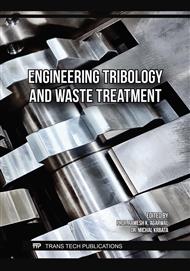p.61
p.71
p.77
p.83
p.89
p.97
p.103
p.109
p.117
Cleaner Bio-Based Plasticizer Synthesis from Waste Cooking Oil to Substitute Toxic Dioctyl Phthalate in PVC Film
Abstract:
This research aimed to investigate the possibility of synthesizing a bio-based plasticizer from waste cooking oil using an epoxidation reaction to replace dioctyl phthalate (DOP) in PVC film, which is toxic and hazardous to human health and the environment. This involved synthesizing used household oil through an epoxidation reaction to introduce epoxy groups, followed by isopropyl alcohol to break the epoxy rings and form hydroxyl groups. The chemical structure of the epoxidized waste cooking oil plasticizer was analyzed using Fourier transform infrared spectroscopy (FT-IR), with a focus on confirming the presence of epoxy groups within the 3,500 – 3,000 cm-1 range. Subsequently, this bio-based plasticizer was used in various ratios to DOP to produce PVC films, including ratios of 5:0, 4:1, 3:2, 2:3, 1:4, and 0:5. These PVC films were subject to a comprehensive examination of their physical and chemical properties, including their resistance to tensile stress, elongation ability, the impact on molecular functional groups in the PVC film, and a leaching test. The results showed that the optimal proportion of epoxidized waste cooking oil plasticizer to DOP was 5:0. This ratio demonstrated superior tensile strength, enhanced elongation capacity, increased thermal stability, and exhibited the most robust resistance against solvents compared to other ratios tested.
Info:
Periodical:
Pages:
103-108
Citation:
Online since:
June 2025
Keywords:
Price:
Сopyright:
© 2025 Trans Tech Publications Ltd. All Rights Reserved
Share:
Citation:


